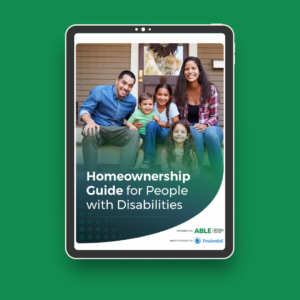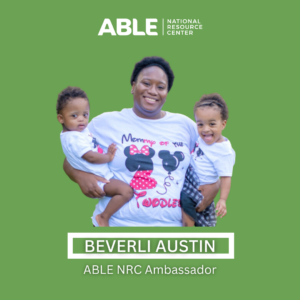The Summer issue of our AchievABLE™ Newsletter contains stories on the following:
- June is National Homeownership Month
- Housing Rights
- Summer, a Season for Youth Employment
- ABLE National Resource Center Website: New Look, Same Great Resources
- ABLE Ambassador Spotlight
- Meet CalABLE’s Newly Appointed Executive Director
- New Resources
- ABLE Questions & Answers
- Advancing ABLE
June is National Homeownership Month
 At National Disability Institute (NDI), we are committed to building a better financial future for people with disabilities and their families. Sometimes, this starts with a job, sometimes that starts with getting a bank account, opening an ABLE account and learning more about credit and financial tips to help through difficult times. Another huge opportunity for people with disabilities to improve their own financial situation is through home ownership. According to Thomas Foley, NDI’s Executive Director, “homeownership allows people with disabilities to build wealth over time through mortgage payments that ultimately fund your own asset, rather than someone else’s. It also offers valuable tax benefits and the freedom to customize your living space to fit your lifestyle. Perhaps most importantly, the pride and sense of accomplishment that comes with being a homeowner can have an incredibly positive effect on your overall happiness and financial security.”
At National Disability Institute (NDI), we are committed to building a better financial future for people with disabilities and their families. Sometimes, this starts with a job, sometimes that starts with getting a bank account, opening an ABLE account and learning more about credit and financial tips to help through difficult times. Another huge opportunity for people with disabilities to improve their own financial situation is through home ownership. According to Thomas Foley, NDI’s Executive Director, “homeownership allows people with disabilities to build wealth over time through mortgage payments that ultimately fund your own asset, rather than someone else’s. It also offers valuable tax benefits and the freedom to customize your living space to fit your lifestyle. Perhaps most importantly, the pride and sense of accomplishment that comes with being a homeowner can have an incredibly positive effect on your overall happiness and financial security.”
Thanks to support from Prudential, the ABLE National Resource Center (ABLE NRC) is excited to share the publication of two housing guides.
Home Inheritance Guide for People with Disabilities
Achieving a Better Life Experience (ABLE) and Homeownership Guide for People with Disabilities
Click on the links above to download for free and learn how an ABLE account can support home ownership. Please share these new resource links with your networks. Home inheritance and homeownership are possible for people with disabilities!
Housing Rights
Although the Americans with Disabilities Act (ADA) is a comprehensive law, it only applies in specific housing situations. Title II of the ADA covers housing provided by public entities (state and local governments), such as housing on a state university campus or by a public housing authority, and Title III of the ADA covers places of public accommodation, such as social service establishments and housing provided on behalf a place of education.
Questions about a landlord providing reserved parking near a tenant’s apartment in a private complex, or about grab bars in a condominium bathroom, or permission to have an emotional support animal in a complex with a “no pets” policy, are important. However, these types of situations are covered by the Fair Housing Act (FHA) not by the ADA.
For more information on housing-related rights and the ADA, check out Northeast ADA’s blog post!
Summer, a Season for Youth Employment
 Working a summer job can result in a real boost for ABLE savings. Some schools, community organizations and the Department of Labor offer employment opportunities for youth, including youth who have disabilities. Supplemental Security Income (SSI) beneficiaries under the age of 22 who work and attend school regularly are encouraged to work and use the Student Earned Income Exclusion work support. With Social Security Administration (SSA) approval, up to $2,290 per month in earnings and up to $9,230 in earnings per year will not reduce SSI. And, if this money (and more) is saved in an ABLE account, it will not affect the youth’s SSI payment. These supports can be a game changer, helping to build self-confidence and laying the foundation for employment, regular earnings, savings and investing with ABLE into the future!
Working a summer job can result in a real boost for ABLE savings. Some schools, community organizations and the Department of Labor offer employment opportunities for youth, including youth who have disabilities. Supplemental Security Income (SSI) beneficiaries under the age of 22 who work and attend school regularly are encouraged to work and use the Student Earned Income Exclusion work support. With Social Security Administration (SSA) approval, up to $2,290 per month in earnings and up to $9,230 in earnings per year will not reduce SSI. And, if this money (and more) is saved in an ABLE account, it will not affect the youth’s SSI payment. These supports can be a game changer, helping to build self-confidence and laying the foundation for employment, regular earnings, savings and investing with ABLE into the future!
ABLE National Resource Center Website: New Look, Same Great Resources
The ABLE NRC is thrilled to introduce our updated website home page and our new logo! It is a fresh look that reflects our commitment to being the leading, comprehensive source of objective, independent and reliable ABLE information. Be sure to go to the “Save” tab and see the ABLE plans’ updates in our comparison tools. Many plans have reduced fees, increased their balance limits and more.
In 2023, we had 160,580 website visitors and interest continues to grow. For #ABLEtoSAVE month 2024, we had a total of 27,000 website visitors. Our state comparison tool is one of the top three most popular web pages visited. Check us out at www.ablenrc.org and view the vast library of ABLE-related resources and best practice guidance we have curated over the past 9 years to support the use of ABLE accounts and to educate and promote the positive impact ABLE can make on the lives of millions of Americans with disabilities.
ABLE Ambassador Spotlight

Beverli Austin, ABLE NRC Ambassador, shares her story in a YouTube video for Fund My Future PGH Program. Beverly lives with her two young children in Pennsylvania. One of her children has a PA 529 college savings account and her son, who has Down syndrome, is a PA ABLE account owner. Beverly shares, “The ABLE account not only allows him to keep his federal mandated benefits, but it also allows him to save way over $2,000. I may not know what our future holds, but I do rest a little easier knowing that financially I can help him even after I am no longer here to physically help him. The ABLE account is a life saver for us.” Thank you, Beverli, for sharing the importance of saving and the power of ABLE accounts!
Meet CalABLE’s Newly Appointed Executive Director
 Thomas Martin joins CalABLE after serving Veterans for more than 10 years in the Veterans Homes Division at the California Department of Veterans Affairs (CalVet). He has a professional background in strategic growth and stakeholder outreach and personal experience navigating the service networks in California. Prior to CalVet, he held several appointments in the Office of the Governor. He has been diagnosed with autism spectrum disorder (ASD) and is the proud father of two children with ASD. Thomas Martin states, “CalABLE accounts are critical tools for helping children transition to adulthood, and for allowing adults to thrive.” The ABLE NRC looks forward to future collaboration as CalABLE continues to grow and serve those in need.
Thomas Martin joins CalABLE after serving Veterans for more than 10 years in the Veterans Homes Division at the California Department of Veterans Affairs (CalVet). He has a professional background in strategic growth and stakeholder outreach and personal experience navigating the service networks in California. Prior to CalVet, he held several appointments in the Office of the Governor. He has been diagnosed with autism spectrum disorder (ASD) and is the proud father of two children with ASD. Thomas Martin states, “CalABLE accounts are critical tools for helping children transition to adulthood, and for allowing adults to thrive.” The ABLE NRC looks forward to future collaboration as CalABLE continues to grow and serve those in need.
New Resources
ABLE NRC Webinars On Demand
April 16, 2024 — ABLEtoSAVE Opens the Door to Housing Opportunities
April 25, 2024 —ABLEto$ABLEtoSAVE for Lifelong Financial Wellness
May 14, 2024 —Maximizing Your ABLE Account: Strategies for Empowered Saving
All our past webinars are available 24/7 on ABLE NRC’s website at Webinars-on-Demand.
Office of Disability Employment Policy (ODEP) Toolkit
Secure Your Financial Future: Toolkit for Individuals with Disabilities The financial toolkit is an up-to-date repository of financial literacy tools and resources. It provides a path forward based on where you are in your employment journey.
Choose any of the topic areas below — Preparing for a Job, Starting a Job, Maintaining a Job, Changing or Losing a Job, and Retiring from a Job — for answers to important questions, including tools and resources to help you meet your financial goals.
ABLE Questions & Answers
I have purchased a new home and will move from one state to another. Am I required to move my ABLE account to my new state?
No. You have a choice. You can move from one state to another and keep the same ABLE account or transfer funds from your ABLE account to the new state’s ABLE plan. You can either choose a program-to-program transfer or rollover. You may want to explore the new state’s plan. It may offer a state credit or deduction for in-state residents or, it may have lower costs or features to your advantage. If you choose to rollover money from an ABLE plan to ABLE plan, be sure to coordinate with both states, adhere to the time limits for the rollover, and be aware that you can only rollover funds one-time every twelve months. Once the funds are rolled over, the first account must be closed since a person can have one ABLE account. When the entire balance of an ABLE account is transferred to another ABLE program, the first ABLE account is closed after the transfer is complete. A program-to-program transfer is not a distribution, so the transferred funds are not counted as additional contributions. Refer to 2023 Publication 907 (irs.gov).
Rent and mortgage payments are often due on the first of the month. How do I pay this on time if funds are counted as a resource if not used in the month they are withdrawn?
There are a couple of ways to handle this: (1) You can withdraw the money and pay the rent or mortgage payment in advance of the due date; (2) You can set up a periodic, pre-scheduled withdrawal which is sent by ACH to the landlord of mortgage holder that you designate. Check with your ABLE plan to see if your plan allows this second option.
I have a 529 Qualified Tuition Plan (QTP) for our child and now we think they will not be going to college. Can we still roll a portion of the savings into the ABLE account?
Yes. The IRS allows for up to $18,000, from all combined sources to be deposited into an ABLE account in 2024. If the QTP contains more than $18,000 or if money has been contributed into the ABLE account this calendar year leaving less than $18,000 remaining to be contributed, it may take more than one rollover/one year for all QTP funds to be moved into the ABLE account. The legislation that allows for 529 QTP to rollover funds without taxation expires on 1/2026. Families are encouraged to rollover 529 QTP funds to an ABLE account now. Congress would need to approve an extension to allow rollovers after 2025.
Advancing ABLE
ISS Marketing Intelligence Reports March 2024 Quarterly ABLE Market Sizing Data
171,571 accounts with $1.919 billion assets invested in ABLE (529A) accounts
U.S. Department of Health and Human Services (HHS), Administration for Community Living (ACL). The HHS ACL published a conversation about ABLE accounts with Jody Ellis, Director, ABLE National Resource Center on April 15th to help people with disabilities and their families learn about ABLE savings options. Understanding how to manage money is crucial to financial independence for everyone and the increased ability to manage personal finances helps all people participate fully in their communities.
MSN.com shared an online article, How people with disabilities can use an ABLE account to buy a house.
State Legislation
Alabama. In Alabama, tax deductible contributions into an ABLE account sunsets 12/31/25. Alabama HB 249 introduced 2/27/24 would extend the deduction through 12/31/30.
CalABLE. California Senate Bill 1362 introduced 2/16/24 would allow the CalABLE Board to deposit $250 into each new CalABLE savings account and would also allow CalABLE to make additional financial incentives available. Both provisions are subject to appropriation by the legislature. Its potential for positive impact remains a beacon of hope for many, symbolizing a step towards greater inclusivity and financial security.
Iowa. The maximum tax deduction for contributions into I-ABLE accounts was increased to $5,500 higher than it was last year. According to the state Treasurer’s office, there are nearly 67,000 tax-free I-ABLE accounts.
PA Able. For the fourth time in the past three years, PA ABLE reduced their fees. The previous fee cuts were announced in February 2021, January 2022, and April 2023. PA ABLE account assets alone have nearly tripled in just three years and PA ABLE has over 8,700 accounts. Every single dollar saved matters!
Keep watch in Pennsylvania for amendments to the tax code allowing employer contributions in to 529 qualified tuition plans and 529 ABLE accounts owned by the employee. The 529 Tuition Account Program (TAP) Tax Credit HB 1745 was passed unanimously by the Pa House and is onto the Senate.
Rhode Island. The Rhode Island House of Representatives passed House Bill No. 7612 that requires school districts to provide the parent/guardian of a student with an individualized education plan (IEP) with information concerning Achieving a Better Life Experience (ABLE) account program benefits and the program application process. It begins with the 2024-2025 school year. It was referred to House Education on 4/16/2024. Companion bill S2741.pdf (rilegislature.gov) is pending in the RI Senate and was referred to the Senate Education Committee.
